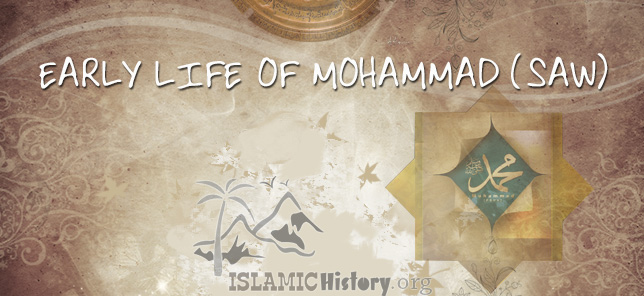Muhammad [saw] was born in Mecca ( Makkah), Arabia, on Monday, 12 Rabi’ Al-Awal (2 August A.D. 570). His mother, Aminah, was the daughter of Wahb Ibn Abdu Manaf of the Zahrah family. His father, ‘Abdullah, was the son of Abdul Muttalib. His genealogy has been traced to the noble house of Ishmael, the son of Prophet Abraham in about the fortieth descend. Muhammad’s father died before his birth.
Life of Prophet Muhammad(pbuh)- Early Life
It was the general custom of the Arabs that their young children were sent to the desert to be brought up with the Bedouins. The tough desert life gave the child a good start in life and the language of the Bedouins was a much purer Arabic. For a few year, they grew up in this harsh but health desert life before returning to their parents.
The Prophet was entrusted to Halima Sadia. She was a poor wet nurse. She and her husband only had a donkey and old she-camel. She did not even have enough milk to feed the other child in her care. It was also the year of famine and drought so they would constantly pray for rain.
None of the other Bedouin wet nurses wanted to take the child Muhammad because he was an orphan. When a child was returned to the family of the foster child, they would reward the wet nurse generously. They couldn’t expect to gain many riches from a child who was an orphan. Every woman got a child to bring up but Halima, who had arrived last and did not find a child to foster. She was ready to go back when she decided to return and collect the child Muhammad, even though he was an orphan.
as soon as she lifted Muhammad (PBUH), her fortunes turned right around and her life was filled with immense good fortune. Both Muhammad and the other foster child were fully fed, even though the previous night there was no milk for the other child. The old she-camel, which had not given a drop of milk, was soon overflowing with milk. Halima was at the very back of the group of women but now was at the front of the group. This was indeed a great blessing for this poor Bedouin family.
Halima knew that she had a blessed child with all the miracles and blessings she was seeing with her own eyes. Halima’s herd of goats used to come home full, and overflowing with milk. The rest of the Bedouins’ goats used to come home scraggy and empty. They used to complain to the shepherd to take the sheep and goats to the same place that Halima takes her flock! There were many more signs about how her life was turned around.
After two years, Muhammad was returned to His mother Amina, but soon Amina was persuaded by Halima to return the baby back with them for another two years. At this time, Halima told Amina about the great blessings that she had received when Muhammad was in her care. There was also an illness in Makkah and the child would be protected from it.
A strange incident took place in the prophet’s childhood. Once both Muhammad and his foster brother were playing in the yard with the goats when the Angel Jibrael appeared to them. The Angel came split open Muhammad’s chest, took out his heart, removed a blood clot, and washed it in Zamzam. The angel then returned the heart to Muhammad’s body before going away. The angel said this was the part of shaytan in you.
His foster brother ran to Halima and said that Muhammad has been murdered. She rushed out and found Muhammad standing with a pale white face. She checked over his body and found that he was fine.
Very shortly she returned him to Amina, his mother. Amina found out from Halima about the events that had taken place. Amina assured Halima that Muhammad was not under the influence of any devil or jinn but even when she was expecting him she had seen great marvels and miracles. Muhammad was returned to the care of his mother Amina and continued to live with her and Barakah.
Before he was six years old his mother died, and the doubly orphaned Muhammad was put under the charge of his grandfather Abdul Muttalib who took the most tender care of him. But the old chief died two years afterwards. On his deathbed he confided to his son Abu Talib the charge of the little orphan.
When Muhammad [saw] was twelve years old, he accompanied his uncle Abu Talib on a mercantile journey to Syria, and they proceeded as far as Busra. The journey lasted for some months. It was at Busra that the Christian monk Bahira met Muhammad. He is related to have said to Abu Talib: ‘Return with this boy and guard him against the hatred of the Jews, for a great career awaits your nephew.”
After this journey, the youth of Muhammad seems to have been passed uneventfully, but all authorities agree in ascribing to him such correctness of manners and purity of morals as were rare among the people of Mecca. The fair character and the honorable bearing of the unobtrusive youth won the approbation of the citizens of Mecca, and by common consent, he received the title of “Al Ameen,” The Faithful.
In his early years, Muhammad was not free from the cares of life. He had to watch the flocks of his uncle, who, like the rest of the Bani Hashim, had lost the greater part of his wealth.
From youth to manhood he led an almost solitary life. The lawlessness rife among the Meccans, the sudden outbursts of causeless and bloody quarrels among the tribes frequenting the Fair of Okadh (The Arabian Olympia), and the immorality and skepticism of the Quraish, naturally caused feelings of pity and sorrow in the heart of the sensitive youth. Such scenes of social misery and religious degradation were characteristic of a depraved age.

